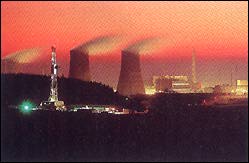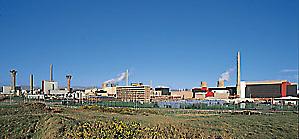|
Home
Contact Us
Sellafield
Faslane
International
Economics
Photos
Links
News
Zero
waste
Message
Board 
|
 |
Congratulations to everyone who made
it to the Faslane/Sellafield protest!
Witness the fitness from RTE news here.

Six nuclear reactors, including four in the Sellafield complex, were
shut
down last week after a malfunction within a reactor in Scotland.
The revelation comes after an investigation which has found that plans
to
clear up the controversial Windscale nuclear reactors, which house one
of
the world's most unstable concentrations of radioactive material, have
been
scrapped.

Problems with rods that control the heat inside a reactor at
Chapelcross on
Solway Firth on the west coast of Scotland have prompted an emergency
investigation by British Nuclear Fuels and Britain's Nuclear
Installations
Inspectorate (NII) watchdog.
Four sister plants of the same design at Sellafield have been shut,
along
with another plant at the Scottish site, while investigations continue.
The heat generated in the plants during nuclear reactions is controlled
by
a series of rods, which are dropped into circular slots in a graphite
core
covered by a metal `charge' plate. One of the rods failed to drop
cleanly,
prompting fears that either the charge plate or core has distorted after
years of nuclear reactions.

A nuclear expert, Dr John Large, told The Sunday Business Post that
doubts
about the controlling mechanisms in the reactors would force their
closure.
"This has all the hallmarks of a very serious incident. The control
rods
are the primary safety system; any doubts about them and the whole
reactor
safety system is at risk. If there are any doubts, the whole reactor
would
have to be shut down," said Large.
The incident at Chapelcross plant comes after a serious accident at the
plant last July when a basket containing radioactive fuel fell 25 metres.
This took place two months after another accident.
In 1967, meltdown almost occurred at the plant, which is situated across
the Irish Sea from Co Down and Co Antrim.
A spokeswoman for the operators, British Nuclear Fuels, said that the
reactors were expected to be reopened "sometime next year".
The plants, which were built in the 1950s, are of similar technology to
the
ill-fated Windscale reactor which went on fire in 1957.
Large recently played a key role in raising the sunken Kursk Russian
submarine and advised Tony Blair while in opposition, and the Irish
government.
He said that failure to decommission the Windscale plant poses a more
serious problem than the new Mox reprocessing plant, over which the
Irish
government took unsuccessful European legal action against the British
government recently.
Home
|
